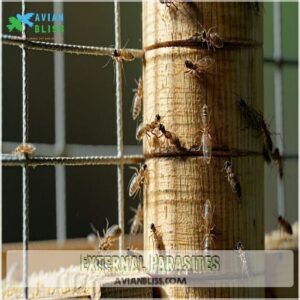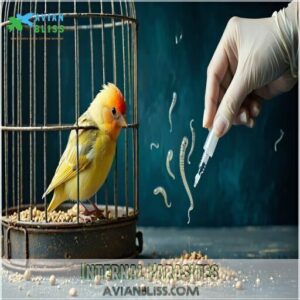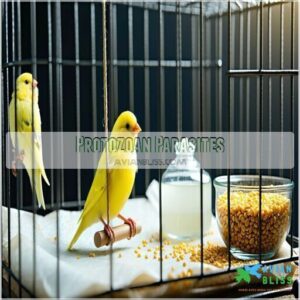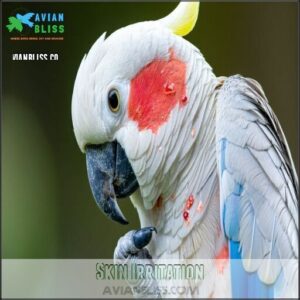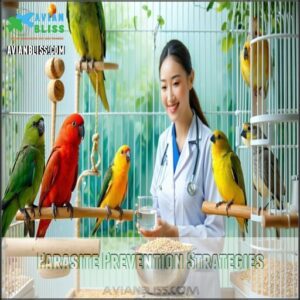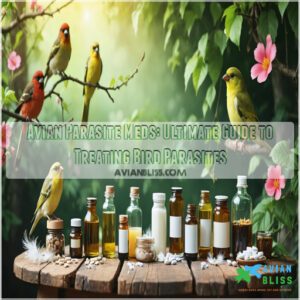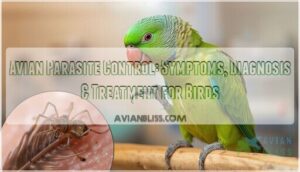This site is supported by our readers. We may earn a commission, at no cost to you, if you purchase through links.
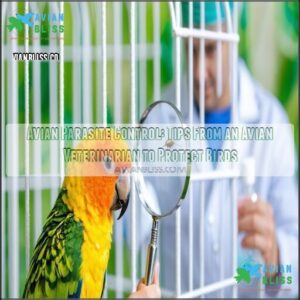
Regular cage cleaning and disinfecting go a long way. Quarantine new birds like you’re running a VIP section; it prevents sneaky parasites from spreading.
Watch for signs like dull feathers, weight loss, or itching. An avian veterinarian is your best ally—they can identify parasites and prescribe treatments like sprays or medicated drops.
Skip the guesswork; a vet knows whether your bird needs ivermectin, fenbendazole, or something else. Prevention’s easier than treatment, so clean often and keep those unwanted guests out!
Table Of Contents
Key Takeaways
- Keep your bird’s cage spotlessly clean with daily waste removal and weekly disinfecting to stop parasites in their tracks.
- Quarantine new birds for at least 30 days to prevent unwanted pests from spreading to your flock.
- Watch for signs like dull feathers, weight loss, or itching, and consult an avian vet to prescribe safe, effective treatments.
- Use a balanced diet, stress-free routines, and regular vet visits to boost your bird’s immune system and overall health.
Avian Parasite Types
Understanding the types of parasites that can affect your bird is key to keeping them healthy.
From external pests like mites to internal invaders like worms, each type needs the right approach to manage.
External Parasites
External parasites like mites and lice can cause feather damage, skin irritation, and feather loss. Stay vigilant for ectoparasites to keep your bird healthy.
- Mite Identification: Look for crusty skin or respiratory issues.
- Lice Treatment: Feather chewing is a telltale sign.
- Topical Solutions: Use safe sprays to kill parasites.
- Preventative Sprays: Regular use keeps problems at bay.
Internal Parasites
Internal parasites, like nematode endoparasites and intestinal worms, can wreak havoc on your bird’s health.
Gizzard worms disrupt digestion, causing malabsorption issues, while others cause weight loss and lethargy.
Regular fecal exams help spot these intruders early. Treating endoparasites often requires precision with antiprotozoal medications.
Knowing the worm lifecycle guarantees you don’t miss re-treatment—prevention beats fighting these pests twice!
Maintaining strict hygiene practices is also key to prevention.
Protozoan Parasites
Protozoan parasites like giardia and trichomoniasis can wreak havoc on a bird’s organs.
Trichomoniasis symptoms include labored breathing and weight loss.
Giardia treatment often involves metronidazole, while carnidazole tackles certain infections.
To prevent coccidia, maintain clean enclosures and fresh water.
Protozoan transmission happens through contaminated food, water, or droppings, so focus on hygiene to protect your feathered friend.
Avian Parasite Symptoms
Spotting signs of parasites in your bird early can make a big difference for their health.
Catch parasite symptoms early to keep your bird happy, healthy, and thriving—it’s all about paying close attention.
Watch for changes like dull feathers, weight loss, itchy skin, or unusual behavior—they might be trying to tell you something’s off.
Feather Abnormalities
Healthy feathers aren’t just for show—they’re a bird’s shield.
Feather discoloration, shaft damage, or unusual growth deformities can point to feather mites or other parasites.
Notice abnormal molting or feather loss? It’s time to act.
Feather plucking may seem like bad behavior, but it’s often a symptom of irritation.
Keep an eye on the feather condition for clues to your bird’s health.
Weight Loss Signs
Spotting weight loss in your bird can be tricky, but it’s a key clue in detecting parasite symptoms.
Look for keel bone prominence and muscle wasting as clear signs.
Appetite changes or malabsorption issues might show up too.
Don’t forget a quick dropping analysis—it can reveal a lot!
Internal parasites can cause these issues.
- Keel bone prominence
- Muscle wasting and weakness
- Malabsorption issues
- Appetite changes
- Unusual droppings
Behavioral Changes
When your bird seems quieter or avoids interaction, those changes might scream for attention.
Social isolation, shifts in vocalizations, or a sudden activity decrease could hint at a parasite problem.
Sleep disturbances and appetite changes are other red flags.
Reach out to an avian veterinarian to guarantee effective bird parasite control, supporting bird health and happiness through specialized treatments.
Skin Irritation
Don’t ignore skin irritation—it’s a flashing red light for parasites.
From reddened patches to crusty skin, mites and lice love to wreak havoc. Feather loss or excessive plucking might also signal trouble.
Watch for these signs:
- Reddened patches or crusty lesions
- Feather plucking or loss
- Constant scratching or discomfort
- Scaly or dry skin areas
- Unexplained behavioral changes
Avian Parasite Control
Keeping your birds parasite-free is as important as providing them with food and water.
With a mix of safe medications, natural remedies, and good cleaning habits, you can keep these tiny pests in check and your feathered friends healthy, which involves maintaining a clean environment and using good cleaning habits.
Medications and Treatments
Got a parasite problem? Medications like ivermectin knock out mites, while praziquantel handles tapeworms like a pro.
Be cautious with fenbendazole—it’s effective but has toxicity risks. Pyrantel’s safety makes it a favorite against roundworms.
Don’t forget, drug resistance is a real issue, so stick to proper dosages. Regular fecal tests can help detect parasite eggs early.
Consult your vet for customized treatment plans.
| Medication | Treats | Caution | Form/Method |
|---|---|---|---|
| Ivermectin | Mites, lice | Follow dosage | Oral, topical |
| Fenbendazole | Worms | Risk of toxicity | Oral |
| Praziquantel | Tapeworms, flukes | None noted | Oral |
| Pyrantel pamoate | Roundworms | Rare side effects | Oral, safe |
Natural Remedies
Think about natural remedies that complement medications. Garlic water offers benefits as a safe internal parasite control. Neem oil works wonders for mites when applied under wings or around vents.
Sprinkle diatomaceous earth in bird areas to deter pests. Probiotics and herbal support, like apple cider vinegar in water, boost gut health and immunity naturally.
Some owners purchase specialized products for this purpose.
- Use garlic water for parasites.
- Apply neem oil on affected spots.
- Sprinkle diatomaceous earth in enclosures.
- Add probiotics to improve digestion, which supports overall bird health.
Environmental Management
Keeping your bird’s environment clean is key to health. Start with daily waste removal and perch disinfection using avian-safe cleaning products.
Choose housing materials that are easy to sanitize. Weekly, do a deep scrub with an avian disinfectant for thorough environmental disinfection.
Good cage ventilation prevents moisture buildup, and regular environmental cleaning guarantees bird cleanliness. Safe products matter—your bird will thank you!
Avian Health Management
You can keep your bird healthy by focusing on regular vet visits, a balanced diet, and stress-free routines.
Don’t forget to quarantine new birds to protect your flock from potential parasites.
Regular Veterinary Care
Annual checkups with an avian veterinarian are your bird’s secret weapon against parasites.
Regular health checks allow early detection of issues through fecal exams and preventative medication.
A customized treatment plan from veterinary consultation guarantees effective avian parasite control.
Trust avian veterinarian services to safeguard your feathered friend’s health before problems spiral—because keeping them healthy beats stressing over late-night emergencies!
Balanced Diet
A bird’s balanced diet is its first defense against parasites.
Mix seeds, fruits, and veggies for immune-boosting benefits, but don’t skimp on food quality control.
Probiotic benefits? Huge for digestion. Monitor for nutritional deficiencies and tweak macronutrient ratios if needed.
A good start is to examine species specific needs to guarantee adequate nutrition.
Add diet variety to avoid boredom. Remember, quality bird food keeps your feathered friend happy, healthy, and parasite-free!
Stress Management
A stress-free environment is key to happy, healthy birds.
Stress-free birds are happy birds—keep routines consistent and environments calm for thriving, healthy feathered friends.
Use enrichment activities and social interaction to keep your feathered friends engaged.
A consistent routine and stable environments help reduce bird stress—think predictable feeding and quiet times.
Limit contact with wild birds and noisy areas to promote calm.
Your bird’s well-being thrives on simple, predictable routines and stress reduction techniques!
Quarantine Procedures
A solid quarantine procedure keeps your flock safe.
Isolate new birds for 30 days to prevent cross-contamination and allow gradual introduction.
Use dedicated supplies and follow strict monitoring protocols for signs of illness.
If issues arise, seek veterinary attention promptly.
- Isolation Duration: Keep newcomers separate for at least 30 days.
- Dedicated Supplies: Use separate feeders, perches, and cleaning tools.
- Monitoring Protocols: Check daily for symptoms like feather loss or lethargy.
Parasite Prevention Strategies
You can keep your birds healthy and parasite-free by focusing on clean environments, proper hygiene, and smart biosecurity habits.
Simple steps like regular cage cleaning and providing a balanced diet can make a huge difference in preventing infestations.
Environmental Cleaning
Keeping your bird’s space clean stops parasites in their tracks.
Daily waste removal and liner replacement are non-negotiable.
Weekly cage disinfection, perch sanitation, and feeder hygiene keep things spotless.
Use avian-safe disinfectants, and don’t skip those hard-to-reach spots.
For selecting the right product, it’s important to use safe cleaning products.
Environmental cleaning isn’t just tidying up—it’s effective bird parasite treatment.
An avian veterinarian can guide you on thorough disinfection practices.
Cage Maintenance
A clean cage keeps your bird happy and healthy.
Swap liners daily to block pesky parasites.
Scrub perches weekly using bird-safe disinfectants—nobody likes a dirty perch!
Stainless steel feeders? Clean those daily for exceptional feeder hygiene.
Sweep out waste regularly to stop bacteria in its tracks.
For convenience, consider purchasing pre-cut cage liners.
Cage cleaning isn’t glamorous, but your bird’s health depends on it—so roll up your sleeves and keep the cage clean!
Biosecurity Measures
Quarantine protocols are your first line of defense in avian parasite prevention.
Isolate new birds for 30 days and stick to strict hand hygiene and clothing sanitation practices.
Sanitize the bird environment by focusing on proper food safety and water sanitation measures.
These hygiene practices stop pests in their tracks, ensuring effective avian parasite control in your flock.
Nutrition and Hygiene
A cleaner cage and a bird-friendly diet keep parasites at bay. Nutrition and hygiene go hand-in-hand for avian health.
Here’s your five-step guide:
- Store bird food properly to avoid contamination.
- Change water daily for quality hydration.
- Prioritize balanced diets for immunity.
- Practice cage cleaning weekly.
- Wash hands before and after handling birds to maintain proper hygiene.
Frequently Asked Questions (FAQs)
What are risks of untreated bird parasites?
Ignoring parasites is like leaving a door open for trouble.
They cause weight loss, feather damage, infections, and even organ failure.
Left untreated, your bird’s health declines rapidly, leading to suffering or death.
Don’t ignore them!
How can parasites affect bird reproduction?
Parasites can mess with a bird’s ability to reproduce by draining their energy, messing up hormone levels, or damaging reproductive organs.
They might lay fewer eggs, or offspring can hatch weak, leading to poor survival rates.
Do specific seasons increase parasite infestations?
Up to 70% of bird mites thrive during warm, humid seasons.
You’ll notice parasites becoming a bigger problem in spring and summer when conditions favor reproduction.
Keep your birds’ environment clean to stay ahead!
Can wild birds transmit parasites to pets?
Wild birds can absolutely transmit parasites to pets.
They might sneakily leave behind mites, lice, or worms in shared environments like feeders or water sources.
Keep things clean and monitor your pets to stay ahead of infestations!
How to safely dose medication for birds?
Start by weighing your bird to guarantee accurate dosing based on its size.
Use a syringe or dropper for liquids, and always consult your vet for exact instructions.
Too much can harm, not help!
Conclusion
Think of avian parasite control like locking your front door—it’s all about preventing intruders.
By keeping your bird’s environment spotless and maintaining biosecurity, you’re already ahead. Watch out for signs like feather changes or itching, and don’t hesitate to consult an avian veterinarian for customized treatments.
A healthy diet, regular vet visits, and stress-free care add extra layers of protection. Staying proactive guarantees your feathered friend thrives without unwanted guests tagging along.
Prevention truly beats cure!

